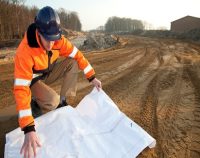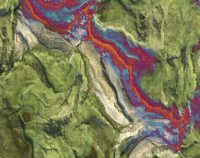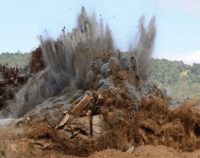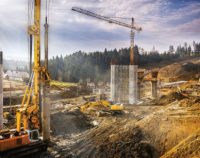Showing 61–80 of 85 results
Pavement Design for Roads, Streets, Walks, and Open Storage Areas: 6 PDH
$36.00 Add to cartThis online course provides guidance for design of pavements and supporting materials for roads, streets, walks and open storage areas. The contents include procedures for conducting preliminary site reconnaissance, traffic analyses, and criteria for the design of subgrade, subbase, base courses, flexible and rigid pavements.Instructor: Raymond Bosek, PEThis online course provides guidance for design of pavements and supporting materials for roads, streets, walks and open storage areas. The contents include procedures for conducting preliminary site reconnaissance, traffic analyses, and criteria for the design of subgrade, subbase, base courses, flexible and rigid pavements.
SPECIFIC KNOWLEDGE OR SKILL OBTAINED
This course teaches the following specific knowledge and skills:
- Preliminary Soil Investigations
- Vehicular Traffic Considerations
- Flexible Pavement Materials & Subgrades
- Bituminous Pavement
- Flexible Pavement Design
- Rigid Pavement Design
- Concrete Pavement Design
- Reinforced Concrete Pavements
- Pavement Overlays
- Joints For Plain & Reinforced Concrete
- Roller-Compacted Concrete Pavements
- Seasonal Frost Conditions
CERTIFICATE OF COMPLETION
You will be able to immediately print a certificate of completion after passing a 20 question multiple-choice quiz. The quiz can be retaken unlimited times until a passing grade of 70% or better is earned. This course satisfies 6 professional development hours (PDH) of continuing education.
Preview CourseClick “Preview Course” to View Prior to PurchaseClick “Add to Cart” to Purchase and Access QuizPonds – Planning, Design, Construction: 2 PDH
$12.00 Add to cartThis course provides guidance on some of the required criteria the United States Department of Agriculture (USDA) has in place for the planning, design, construction and maintenance of ponds. This course describes basic design principles of embankment and excavation ponds as well as construction requirements. This online PDH course is intended for hydrologists, civil engineers, agricultural engineers, construction engineers, municipal engineers, geotechnical engineers and environmental engineers.Instructor: Raymond Bosek, PEThis course provides guidance on some of the required criteria the United States Department of Agriculture (USDA) has in place for the planning, design, construction and maintenance of ponds. This course describes basic design principles of embankment and excavation ponds as well as construction requirements. Topics include: water needs, preliminary soil investigations, watershed & stormwater runoff estimation, basin sealing, spillways and inlets, and operation & maintenance. This online PDH course is intended for hydrologists, civil engineers, agricultural engineers, construction engineers, municipal engineers, geotechnical engineers and environmental engineers.
SPECIFIC KNOWLEDGE OR SKILL OBTAINED
This course teaches the following specific knowledge and skills:
- Become familiar with the general features and the differences of embankment and excavated ponds
- How to perform a preliminary investigation
- Be able estimate storm water runoff quantity and rate using the runoff curve number method
- Estimate time of concentration for a watershed for a given flow length and average watershed slope
- Advantages and disadvantages of a hooded or canopy inlet spillway and a drop inlet spillway
- Estimate earthfill requirements for an embankment for known end areas and embankment length
- Estimate embankment end area for known embankment height, side slopes, and top width
CERTIFICATE OF COMPLETION
You will be able to immediately print a certificate of completion after passing a 16 question multiple-choice quiz. The quiz can be retaken unlimited times until a passing grade of 70% or better is earned. This course satisfies 2 professional development hours (PDH) of continuing education.
Preview CourseClick “Preview Course” to View Prior to PurchaseClick “Add to Cart” to Purchase and Access QuizPrescriptive Method for Structural Insulated Panels (SIPs) in Construction: 3 PDH
$18.00 Add to cartIn this course the student will learn prescriptive requirements to facilitate the use of Structural Insulated Panels (SIPs) in wall systems for the construction of one- and two-family dwellings. Instructor: Raymond Bosek, PESPECIFIC KNOWLEDGE OR SKILL OBTAINED
This course teaches the following specific knowledge and skills:
- Explain SIP materials, shapes, & standard sizes
- Understand prescriptive provisions for wall thickness selection
- Discuss Above grade wall requirements
- Discuss SIP header & connection details
- Explain construction details to design and construct residential wall systems using SIPs
CERTIFICATE OF COMPLETION
You will be able to immediately print a certificate of completion after passing a 15 question multiple-choice quiz. The quiz can be retaken unlimited times until a passing grade of 70% or better is earned. This course satisfies three professional development hours (PDH) of continuing education.
Preview CourseClick “Preview Course” to View Prior to PurchaseClick “Add to Cart” to Purchase and Access QuizPublic Land Survey: Rectangular System: 8 PDH
$40.00 Add to cartIn this course the student will review the rectangular surveying system which has been used continuously in the United States since 1785. As all facets of this system occasionally come into use, the student will become well versed in the field procedures of conducting an original survey covering both historical and current methods.Instructor: Raymond Bosek, PESPECIFIC KNOWLEDGE OR SKILL OBTAINED
This course teaches the following specific knowledge and skills:
- Explain the general scheme of the rectangular system: points, meridian, base lines, parallels, etc.
- Understand township boundaries
- Discuss subdivision of townships
- Discuss extension and completion surveys
- Explain methods of section subdivision
- Discuss protraction diagrams and developing amended diagrams
- Explain methods of surveying amended protraction diagrams
- Discuss meandering & swamp/overflowed lands
- Discuss limits of closure for original survey & soil classification
- Understand legal settings of Ordinary High Water Mark (OHWM)
CERTIFICATE OF COMPLETION
You will be able to immediately print a certificate of completion after passing a 25 question multiple-choice quiz. The quiz can be retaken unlimited times until a passing grade of 70% or better is earned. This course satisfies eight professional development hours (PDH) of continuing education.
Preview CourseClick “Preview Course” to View Prior to PurchaseClick “Add to Cart” to Purchase and Access QuizPumped Storage Hydropower and Conduit Hydropower: 1 PDH
$6.00 Add to cartIn this online course a student will learn about the different ways pumped storage hydropower and conduit hydropower can enhance renewable energy portfolio's, the steps necessary to develop this new technology, and the common barriers encountered for deployment.Instructor: Seth Grablow, PEIn this online course a student will learn about the different ways pumped storage hydropower and conduit hydropower can enhance renewable energy portfolio's, the steps necessary to develop this new technology, and the common barriers encountered for deployment.
SPECIFIC KNOWLEDGE OR SKILL OBTAINED
This course teaches the following specific knowledge and skills:
- Understanding of pumped storage hydropower
- Understanding of potential hydropower from conduits
- Addresses the technical flexibility that existing pumped storage facilities can provide to support intermittent renewable energy generation
- Describing grid reliability benefits
- Understanding the differences between Pumped storage hydropower and conduit hydropower
- Safety aspects of constructing conduit hydropower projects on existing water-conveyance structures
- Current status and the future outlook for PSH in the United States
CERTIFICATE OF COMPLETION
You will be able to immediately print a certificate of completion after passing a 10 question multiple-choice quiz. The quiz can be retaken unlimited times until a passing grade of 70% or better is earned. This course satisfies three (1) continuing education hour (CEH)/professional development hour (PDH) of continuing education.
Preview CourseClick” Preview Course” to View Prior to PurchaseClick “Add to Cart” to Purchase and Access QuizRemote Sensing Essentials: 5 PDH
$30.00 Add to cartIn this course the student will understand the theory and practice of remote sensing and image processing. Remote sensing is valuable tool for engineers and surveyors as it provides a cost-effective means of surveying, monitoring, and mapping objects at or near the surface of the Earth.Instructor: Raymond Bosek, PESPECIFIC KNOWLEDGE OR SKILL OBTAINED
This course teaches the following specific knowledge and skills:
- Explain remote sensing and its applications
- Discuss the basic components of remote sensing
- Discuss the history and future of remote sensing
- Understand three-dimensional (3d) data acquisition
- Describe elements of processing geospatial data
- Explain image enhancements
- Explain Digital Elevation Models (DEMs)
CERTIFICATE OF COMPLETION
You will be able to immediately print a certificate of completion after passing a 20 question multiple-choice quiz. The quiz can be retaken unlimited times until a passing grade of 70% or better is earned. This course satisfies five (5) hours of professional development (PDH).
Preview CourseClick “Preview Course” to view prior to purchaseClick “Add to Cart” to purchaseResidential Structural Design: 5 PDH
$30.00 Add to cartIn this course the student will understand the basics of residential construction and design, residential structural design concepts and design loads for residential buildings and to gain an understanding of modern design methods and concepts for light-frame homes, apartments, and townhouses.Instructor: Raymond Bosek, PESPECIFIC KNOWLEDGE OR SKILL OBTAINED
This course teaches the following specific knowledge and skills:
- Explain American housing relative to its history, construction characteristics, regulation, and performance experience
- Discuss structural sesign as it applies to residential buildings
- Discuss the latest technical knowledge and engineering approaches for the design of homes
- Explain design loads for residential buildings
- Explain the various loads and load combinations
- Review the various design approaches and corresponding calculations
CERTIFICATE OF COMPLETION
You will be able to immediately print a certificate of completion after passing a 20 question multiple-choice quiz. The quiz can be retaken unlimited times until a passing grade of 70% or better is earned. This course satisfies five (5) hours of professional development (PDH).
Preview CourseClick “Preview Course” to view prior to purchaseClick “Add to Cart” to purchaseRock Excavations Blasting Design Part 1: 6 PDH
$36.00 Add to cartIn this course the student will understand the fundamentals of blasting for rock excavations by learning the art and design of using explosives for the removal of rock and similar materials for construction activities. This is part 1 of a 2 part series.Instructor: Raymond Bosek, PESPECIFIC KNOWLEDGE OR SKILL OBTAINED
This course teaches the following specific knowledge and skills:
- Discuss the history of explosives in construction
- Identify basic blasting terminology
- Explain the different types of explosives
- Determine optimal explosives for use cases
- Discuss the various types of initiation systems
- Discuss common geology encountered and blast design characteristics
- Explain site exploration activities and common hazards
CERTIFICATE OF COMPLETION
You will be able to immediately print a certificate of completion after passing a 20 question multiple-choice quiz. The quiz can be retaken unlimited times until a passing grade of 70% or better is earned. This course satisfies 6 professional development hours (PDH) of continuing education.
Preview CourseClick “Preview Course” to View Prior to PurchaseClick “Add to Cart” to Purchase and Access QuizRoller Compacted Concrete Pavements: 1 PDH
$6.00 Add to cartIn this course the student will understand RCC pavement, RCC mixtures and construction of RCC pavements.Instructor: Raymond Bosek, PEIn this course the student will understand RCC pavement, RCC mixtures and construction of RCC pavements.SPECIFIC KNOWLEDGE OR SKILL OBTAINED
This course teaches the following specific knowledge and skills:
- Materials Used For RCC Pavements
- Construction Consideration
- Paving Operations
CERTIFICATE OF COMPLETION
You will be able to immediately print a certificate of completion after passing a 10 question multiple-choice quiz. The quiz can be retaken unlimited times until a passing grade of 70% or better is earned. This course satisfies one (1) professional development hour (PDH) of continuing education.
Preview CourseClick “Preview Course” to View Prior to PurchaseClick “Add to Cart” to Purchase and Access QuizRoundabouts Part 1: 3 PDH
$18.00 Add to cartThis is part I of a three-part series, this is the first course covering the first 2 chapters of Roundabouts: An Informational Guide from the Federal Highway Administration. This course gives you an introduction to the features and benefits of the many different types of roundabouts. It also covers the safety, cost and policy concerns related to building roundabouts.Instructor: Raymond Bosek, PEThis is part I of a three-part series, this is the first course covering the first 2 chapters of Roundabouts: An Informational Guide from the Federal Highway Administration. This course gives you an introduction to the features and benefits of the many different types of roundabouts. It also covers the safety, cost and policy concerns related to building roundabouts.
SPECIFIC KNOWLEDGE OR SKILL OBTAINED
This course teaches the following specific knowledge and skills:
- Understanding of the development of the roundabouts
- Reviewing the types of roundabouts
- Describing roundabout design features
- Understanding the differences between roundabouts and traffic circles
- Safety aspects of roundabouts
- Multimodal considerations of roundabouts
CERTIFICATE OF COMPLETION
You will be able to immediately print a certificate of completion after passing a 20 question multiple-choice quiz. The quiz can be retaken unlimited times until a passing grade of 70% or better is earned. This course satisfies three (3) continuing education hour (CEH)/professional development hour (PDH) of continuing education.
Preview CourseClick” Preview Course” to View Prior to PurchaseClick “Add to Cart” to Purchase and Access QuizRoundabouts Part 2: 5 PDH
$30.00 Add to cartThis is part II of a three-part series. The second course covering chapters 3, 4, & 5 of Roundabouts: An Informational Guide from the Federal Highway Administration. This course provides an in-depth look into planning a roundabout and what factors to account for when designing it. Also, it covers what is necessary to operate a successful roundabout and the cause and effect of different features. Last, you will understand the differences in safety between roundabouts and signalized intersections.Instructor: Raymond Bosek, PEThis is part II of a three-part series. The second course covering chapters 3, 4, & 5 of Roundabouts: An Informational Guide from the Federal Highway Administration. This course provides an in-depth look into planning a roundabout and what factors to account for when designing it. Also, it covers what is necessary to operate a successful roundabout and the cause and effect of different features. Last, you will understand the differences in safety between roundabouts and signalized intersections.
SPECIFIC KNOWLEDGE OR SKILL OBTAINED
This course teaches the following specific knowledge and skills:
- Planning and design of roundabouts
- Comparing operational performance
- Space and economic evaluations
- Traffic operations
- Performance Analysis
- Safety and statistics
- Crash prediction models
CERTIFICATE OF COMPLETION
You will be able to immediately print a certificate of completion after passing a 30 question multiple-choice quiz. The quiz can be retaken unlimited times until a passing grade of 70% or better is earned. This course satisfies five (5) continuing education hour (CEH)/professional development hour (PDH) of continuing education.
Preview CourseClick “Preview Course” to View Prior to PurchaseClick “Add to Cart” to Purchase and Access QuizRoundabouts Part 3: 5 PDH
$30.00 Add to cartThis is part III of a three-part series. The third course covering the final chapters 6, 7, & 8 of Roundabouts: An Informational Guide from the Federal Highway Administration. In this course the student will learn the many different ways to design a roundabout and what steps are taken to ensure the most efficient and safe roundabout for a given location. Also covered are the signage requirements, landscaping potential, and multi-roundabout systems that can be used when designing a roundabout.Instructor: Raymond Bosek, PEThis is part III of a three-part series. The third course covering the final chapters 6, 7, & 8 of Roundabouts: An Informational Guide from the Federal Highway Administration. In this course the student will learn the many different ways to design a roundabout and what steps are taken to ensure the most efficient and safe roundabout for a given location. Also covered are the signage requirements, landscaping potential, and multi-roundabout systems that can be used when designing a roundabout.
SPECIFIC KNOWLEDGE OR SKILL OBTAINED
This course teaches the following specific knowledge and skills:
- Design principles
- Geometric elements
- Double-Lane, rural, and mini-roundabouts
- Traffic design
- Signage, markings, and illumination
- Other design considerations
- Crash prediction models
CERTIFICATE OF COMPLETION
You will be able to immediately print a certificate of completion after passing a 30 question multiple-choice quiz. The quiz can be retaken unlimited times until a passing grade of 70% or better is earned. This course satisfies five (5) continuing education hour (CEH)/professional development hour (PDH) of continuing education.
Preview CourseClick “Preview Course” to View Prior to PurchaseClick “Add to Cart” to Purchase and Access QuizSatellite Photogrammetry: 2 PDH
$12.00 Add to cartIn this course the student will learn about satellite photogrammetry and its commom applications. The student will review geo-positioning from satellite images and procedures for creating stereo pairs from satellite imagery as well as reviewing the top things to consider in buying optical satellite imagery.Instructor: Raymond Bosek, PESPECIFIC KNOWLEDGE OR SKILL OBTAINED
This course teaches the following specific knowledge and skills:
- Explain the characteristics of the most popular high- and medium-resolution commercial imaging satellites
- Discuss planimetric, classification, and topographic mapping
- Discuss geo-positioning and convergence angles
- Discuss what to consider in buying optical satellite imagery
CERTIFICATE OF COMPLETION
You will be able to immediately print a certificate of completion after passing a 10 question multiple-choice quiz. The quiz can be retaken unlimited times until a passing grade of 70% or better is earned. This course satisfies two professional development hours (PDH) of continuing education.
Preview CourseClick “Preview Course” to View Prior to PurchaseClick “Add to Cart” to Purchase and Access QuizSeismic Restraints for Mechanical Equipment: 4 PDH
$24.00 Add to cartIn this online course a student will understand the methods and procedures to restraint various types of mechanical equipment for seismic loads. Instructor: Seth Grablow, PESPECIFIC KNOWLEDGE OR SKILL OBTAINED
This course teaches the following specific knowledge and skills:
- Discuss the various types of mechanical equipment which require seismic restraints
- Explain rigid & vibration isolated floor mounting
- Discuss roof mounting seismic restraining
- Explain suspended & wall mounting procedures
- Explain the various types and selection of anchors
- Discuss special cases equipment & methods
CERTIFICATE OF COMPLETION
You will be able to immediately print a certificate of completion after passing a twenty (20) question multiple-choice quiz. The quiz can be retaken unlimited times until a passing grade of 70% or better is earned. This course satisfies four (4) continuing education hours (CEH)/professional development hours (PDH) of continuing education.
Preview CourseClick” Preview Course” to View Prior to PurchaseClick “Add to Cart” to Purchase and Access QuizSite Work Basics: 4 PDH
$24.00 Add to cartIn this course the student will understand the concepts of construction site preparations. This course will offer an essential overview of site surveys, earthwork operations, common equipment and uses, as well as permitting. Instructor: Raymond Bosek, PESPECIFIC KNOWLEDGE OR SKILL OBTAINED
This course teaches the following specific knowledge and skills:
- Explain types of site surveys and their components, including construction surveys, bench marks, datum, and mean sea level
- Explain types of earthwork operations, including pioneering, grubbing, stripping, and drainage
- Describe types of leveling instruments and their uses
- Interpret readings from a leveling rod
- Determine elevations in the field to locate points at specified elevations
- Determine boundaries of building layout
- Determine classes of soils through soils testing
- Determine soil stabilization strategies
CERTIFICATE OF COMPLETION
You will be able to immediately print a certificate of completion after passing a 20 question multiple-choice quiz. The quiz can be retaken unlimited times until a passing grade of 70% or better is earned. This course satisfies four professional development hours (PDH) of continuing education.
Preview CourseClick “Preview Course” to View Prior to PurchaseClick “Add to Cart” to Purchase and Access QuizSlope Stability in Embankments and Structures: 5 PDH
$30.00 Add to cartIn this course the student will understand the design of slope stability in embankments and structures and how to recognize, analyze, and solve slope instability issues encountered.Instructor: Raymond Bosek, PESPECIFIC KNOWLEDGE OR SKILL OBTAINED
This course teaches the following specific knowledge and skills:
- Explain the effects of water on slope stability
- Discuss Factor of Safety in Design
- Understand how to solve slope instability problems
- Explain methods and tools to solve slope instability issues
- Understand methods to improve stability
CERTIFICATE OF COMPLETION
You will be able to immediately print a certificate of completion after passing a 20 question multiple-choice quiz. The quiz can be retaken unlimited times until a passing grade of 70% or better is earned. This course satisfies five (5) hours of professional development (PDH).
Preview CourseClick “Preview Course” to view prior to purchaseClick “Add to Cart” to purchaseStrategies for Improving Sustainability of Asphalt Pavements: 3 PDH
$18.00 Add to cartIn this course the student will understand sustainability throughout the entire pavement life cycle and the importance of recognizing context sensitivity and assessing trade-offs in developing sustainable solutions.Instructor: Raymond Bosek, PESPECIFIC KNOWLEDGE OR SKILL OBTAINED
This course teaches the following specific knowledge and skills:
- Explain selection, design, and production of asphalt materials for sustainability
- Discuss sustainable strategies in asphalt pavement design and construction
- Understand sustainable concepts on preservation/maintenance of asphalt pavements
- Explain asphalt pavement end of life sustainable strategies
CERTIFICATE OF COMPLETION
You will be able to immediately print a certificate of completion after passing a 15 question multiple-choice quiz. The quiz can be retaken unlimited times until a passing grade of 70% or better is earned. This course satisfies three (3) hours of professional development (PDH).
Preview CourseClick “Preview Course” to view prior to purchaseClick “Add to Cart” to purchaseStrategies for Improving Sustainability of Concrete Pavements: 3 PDH
$18.00 Add to cartIn this course the student will understand sustainability throughout the entire concrete pavement life cycle and the importance of recognizing context sensitivity and assessing trade-offs in developing sustainable solutions.Instructor: Raymond Bosek, PESPECIFIC KNOWLEDGE OR SKILL OBTAINED
This course teaches the following specific knowledge and skills:
- Explain selection, design, and production of asphalt materials for sustainability
- Discuss sustainable strategies in asphalt pavement design and construction
- Describe sustainable concepts on preservation/maintenance of asphalt pavements
- Explain asphalt pavement end of life sustainable strategies
CERTIFICATE OF COMPLETION
You will be able to immediately print a certificate of completion after passing a 15 question multiple-choice quiz. The quiz can be retaken unlimited times until a passing grade of 70% or better is earned. This course satisfies three (3) hours of professional development (PDH).
Preview CourseClick “Preview Course” to view prior to purchaseClick “Add to Cart” to purchaseStream Hydraulics: 3 PDH
$18.00 Add to cartIn this online course a student will understand the essentials of stream hydraulics and the various formulas and calculations available to solve problems associated with streams.Instructor: Raymond Bosek, PESPECIFIC KNOWLEDGE OR SKILL OBTAINED
This course teaches the following specific knowledge and skills:
- Understand channel cross-section parameters: flow depth, hydraulic depth, and hydraulic radius
- Discuss the dimensionless numbers
- Understand the continuity equation, Bernoulli equation and conservation of momentum equations
- Explain hydraulic calculations for uniform flow in a stream
- Explain the use of weirs for flow measurement
- Discuss channel routing procedures
CERTIFICATE OF COMPLETION
You will be able to immediately print a certificate of completion after passing a fifteen (15) question multiple-choice quiz. The quiz can be retaken unlimited times until a passing grade of 70% or better is earned. This course satisfies three (3) continuing education hour (CEH)/professional development hour (PDH) of continuing education.
Preview CourseClick” Preview Course” to View Prior to PurchaseClick “Add to Cart” to Purchase and Access QuizStress and Strain in Soils: 4 PDH
$24.00 Add to cartIn this course the student will understand the properties and mechanics of soils and accurately calculate the stresses and deformations of soil masses.Instructor: Raymond Bosek, PESPECIFIC KNOWLEDGE OR SKILL OBTAINED
This course teaches the following specific knowledge and skills:
- Understand weight-volume relationships
- Discuss vertical and lateral stress distributions
- Discuss load deformation processes
- Explain strength of soils
- Understand calculating stress and strain
CERTIFICATE OF COMPLETION
You will be able to immediately print a certificate of completion after passing a 20 question multiple-choice quiz. The quiz can be retaken unlimited times until a passing grade of 70% or better is earned. This course satisfies four (4) hours of professional development (PDH).
Preview CourseClick “Preview Course” to view prior to purchaseClick “Add to Cart” to purchase




















